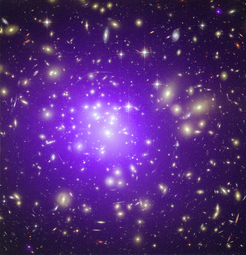Why do galaxies that live in the enormous structures known as galaxy clusters look different from normal, isolated galaxies, such as our Milky Way? To answer this question, an international research team led by MPA has created the Hydrangea simulations, a suite of 24 high-resolution cosmological hydrodynamic simulations of galaxy clusters. Containing over 20,000 cluster galaxies in unprecedented detail and accuracy, these simulations provide astrophysicists with a powerful tool to understand how galaxies have formed and evolved in one of the most extreme environments of our Universe.
Galaxy clusters are giant associations of up to several thousand galaxies, embedded in diffuse hot gas and invisible dark matter (see Fig. 1). Observations have shown that these extreme environments influence the properties of the galaxies within: while isolated galaxies often contain star-forming discs where massive young stars shine in blue, cluster galaxies are mostly yellow or red - indicating that they stopped their star formation several billion years ago. Often, these cluster galaxies present an apparently featureless “elliptical” morphology. Understanding the origin of these differences has been a major unsolved problem in astrophysics for decades.

Fig 1.The Galaxy cluster “Abell 1689”, located approximately 2 billion light years away, is one of the most massive clusters in the known Universe. This picture is a composite of an optical image, taken with the Hubble Space Telescope, and an X-ray observation with the Chandra Space Telescope. The former shows starlight from more than 1000 galaxies, the latter (in purple) the hundred-million-degree hot gas which permeates the space between galaxies and contributes more mass to the cluster than all its galaxies together.

